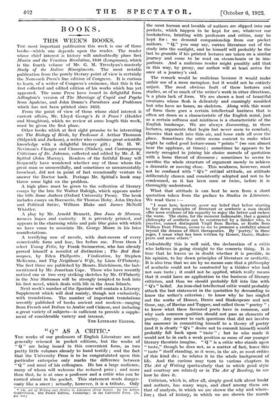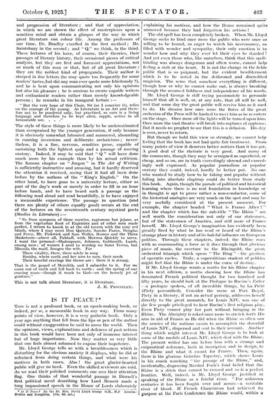" Q" AS A CRITIC.*
THE works of our professors of English Literature are not generally reissued in pocket editions, but the works of " Q " are being issued in this convenient form, as two pretty little volumes already to hand testify ; and the fact that the University Press is to be congratulated upon this particular enterprise only marks the difference between " Q " and most of his colleagues. He has a large audience, many of whom will welcome the reduced price ; and more than that, he is at once a professor and a critic who can be carried about in the pocket. This statement reads danger- ously like a sneer ; actually, however, it is a tribute. Only • The Art of Writing and Studies in Literature (First Series). By Sir Arthur QuIller-Couch. The Pocket Edition. Cambridge : at the University Press. [5s. per 'vol.]
the most human and lovable of authors are slipped into our pockets, which happen to be kept for use, whatever our bookshelves, bristling with professors and critics, may be kept for : we demand companionship from our pocket authors. " Q," you may say, carries literature out of the study into the sunlight, and he himself will probably be the last to grumble if his printed lectures are taken on a similar journey and come to be read on steam-boats or in inn- parlours. And a malicious reader might possibly add that in this way, by proxy, our author will at- least arrive for once at a journey's end.
The remark would be malicious because it would make unfair use of a mere metaphor, but it would not be entirely unjust. The most obvious fault of these lectures and studies, as of so much of the writer's work in other directions, is a plain lack of form. We are shown a host of beautiful creatures whose flesh is delicately and cunningly moulded but who have no bones, no skeleton. Along with this want of form there goes a certain intellectual haziness that is often set down as a characteristic of the English mind, just as a certain softness and mistiness is a characteristic of the English landscape. We are always discovering, in these lectures, arguments that begin but never seem to conclude, theories that melt into thin air, and loose ends all over the place. Sometimes the critic seems content to make what might be called good lecture-room " points " (we can almost hear the applause, at times) ; sometimes he appears to be merely occupied in joining his choice morsels of quotation with a loose thread of discourse ; sometimes he seems to sacrifice the whole structure of argument merely to achieve a dramatic or moving close. This weakness, however, must not be confused with " Q's " critical attitude, an attitude deliberately chosen and consistently adopted and not to be condemned, as it has been once or twice, before it is thoroughly understood.
What that attitude is can best be seen from a short quotation taken from the preface to Studies in Literature. We read there :- " I must here, however, avow my belief that before starting to lay down principles of literature or aesthetic a man should offer some evidence of his capacity to enjoy the better and eschew the worse. The claim, for the moment fashionable, that a general philosophy of aesthetic can be constructed by a thinker who, in practice, cannot distinguish Virgil from Bavius, or Rodin from William Dent Pitman, seems to me to presume a credulity almost beyond the dreams of illicit therapeutics. By ' poetry,' in these pages, I mean what has been written by Homer, Dante, Shakes- peare and some others."
Undoubtedly this is well said, the declaration of a critic who believes in going straight to the concrete thing. It is true that he leaves us in doubt whether it is possible, in his opinion, to lay down principles of literature or aesthetic.
It is also true that we are by no means sure that a philosophy of aesthetic could not be constructed by a thinker who had not sure taste ; it could not be applied, which really means that it could have no application to the business of literary
criticism, and thus we should probably fall into line with " Q's " belief. An iron-clad intellectual critic would probably
attack the last statement in the quotation by demanding to know the writer's criterion ; to know why he has singled out the works of Homer, Dante and Shakespeare and not those, say, of Bavius and Tupper, and called them " poetry " ; to know what these favoured poets have in common, and why such common qualities should not pass as elements of poetry. Any answer to such questions that did not involve the answerer in committing himself to a theory of poetry (and it is clearly " Q's " desire not to commit himself) would probably fall back upon " taste " ; but he who made it would not be in such a weak position as some of our younger literary theorists imagine. " Q " is a critic who stands upon " taste," though he does not, as a matter of faot, leave this " taste " itself standing, as it were, in the air, as most critics of this kind do ; he relates it to the whole background of life. And the curious may turn to various chapters in The Art of Writing (particularly that in which good style and courtesy are related) or in The Art of Reading, to see how he does it.
Criticism, which is, after all, simply good talk about bookf and authors, has many ways, and chief among them are that of analysis, in which we are shown the why and where- fore ; that of history, in which we are shown the march and progression of literature ; and that of appreciation, in which we are shown the effect of masterpieces upon a sensitive mind and obtain a glimpse of the way in which great literature can colour life. Among the professors of our time, Dr. Bradley excelled in the first method ; Mr. Saintsbury in the second ; and " Q," we think, in the third. These lectures of his have, of course, their theories, their passages of literary history, their occasional pieces of critical analysis, but they are first and foremost appreciations, not so much of this man or that, but of all great literature ; they are the noblest kind of propaganda. Their author is steeped in fine letters (he may quote too frequently for some readers' tastes, but did any man ever quote more felicitously ?), and he is bent upon communicating not only his opinions but also his pleasure ; he is anxious to create capable writers and enthusiastic readers rather than merely knowledgeable persons ; he remarks in his inaugural lecture :—
" But the very hope of this Chair, Sir (as I conceive it), relies on the courage of the young. As Literature is an Art and there- fore not to be pondered only, but practised, so ours is a living language and therefore to be kept alive, stipple, active in all honourable use. . . ."
The style of these things is more likely to be underestimated than overpraised by the younger generation, if only because it is obviously somewhat laboured and mannered, abounding in cunning inversions and deliberate archaicisms ; never-
theless, it is a fine, nervous, sensitive prose, capable of sustaining both the lightest quip and a passage of moving oratory. Indeed, it may be said that " Q " will have done
much more by his example than by his actual criticism. The famous chapter on " Jargon " in The Art of Writing is sufficiently instructive and amusing, but it hardly deserved the attention it received, seeing that it had all been done before by the authors of the " King's English." On the
other hand, to have gone to a university lecture, either as part of the day's work or merely in order to fill in an hour before lunch, and to have heard such a passage as the following read aloud and read beautifully, is to have enjoyed a memorable experience. The passage in question (and there are plenty of others equally good) occurs at the end of the lectures on the seventeenth century mystical poets (Studies in Literature)
" So from symposia of these mystics, rapturous but jejune, as from the vegetarian feast of Eugenists and of other men made perfect, I return to knock in at the old tavern with the cosy red blinds, where I may meet Don Quixote, Sancho Panza, Douglas and Percy, Mr. Pickwick and Sam Weller, Romeo and the Three Musketeers—above all, Falstaff, with Mistress Quickly to serve. I want the personal—Shakespeare, Johnson, Goldsmith, Lamb, among men : of women I need to worship no Saint Teresa, but .Miranda the maid, Imogen the wife. For
There vitality, there, there solely in song Resides, where earth and her uses to men, their needs Their: forceful cravings the theme are : there it is strong.
That is the gospel of Meredith, and I subscribe to it. For we come out of earth and fall back to earth ; and the spring of our craving soars—though it reach to God—on the homely jet of gcniturc."
This is 'not talk about literature, it is literature.
J. B. PRIESTLEY.











































 Previous page
Previous page